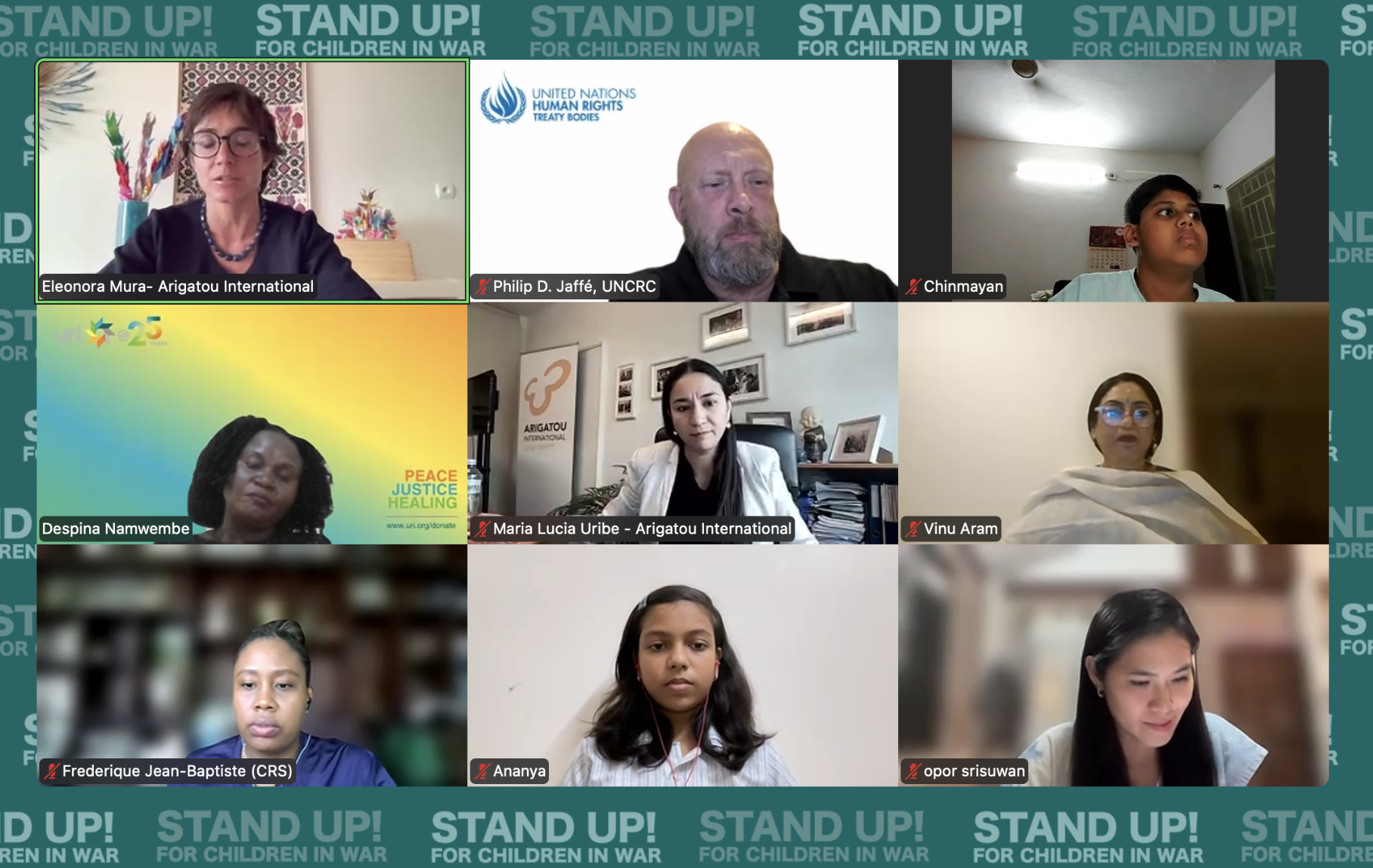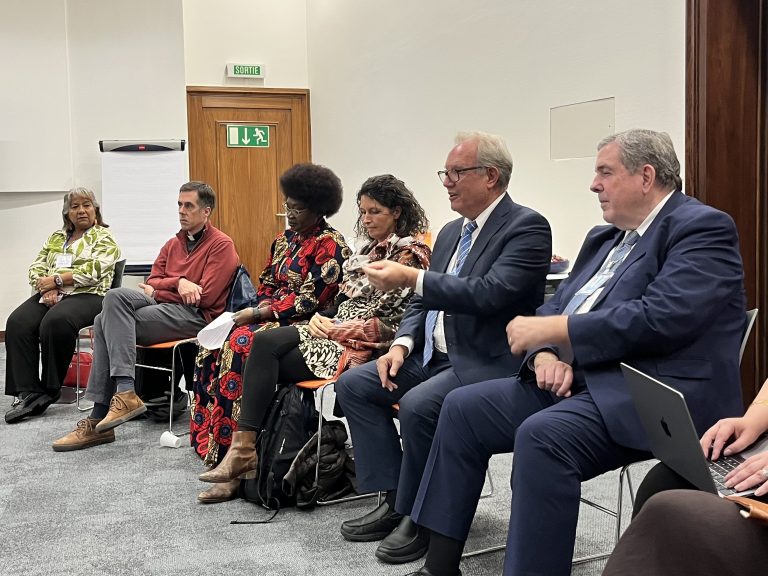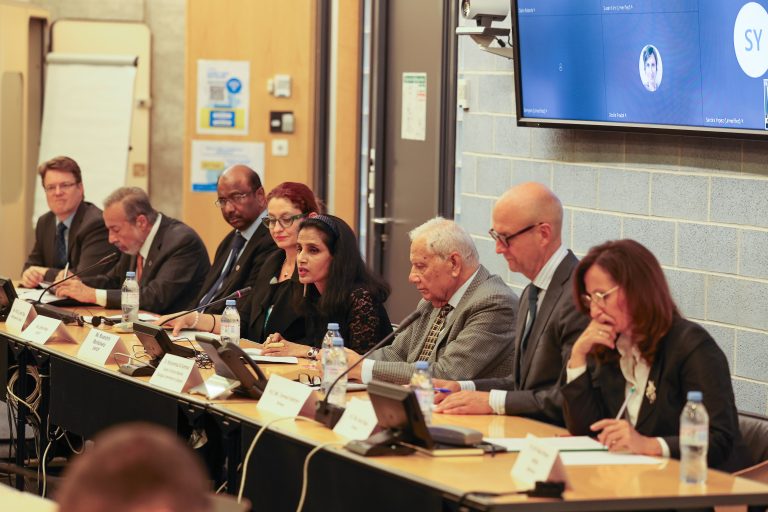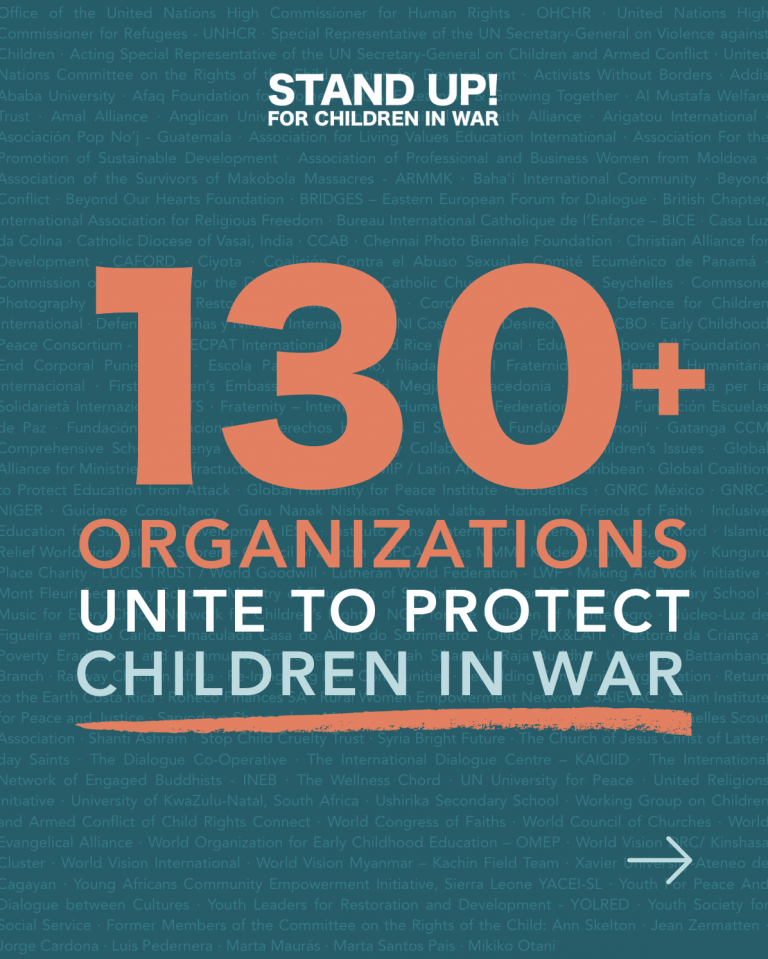Global Gathering Calls for Ethical Action to Protect Children in War
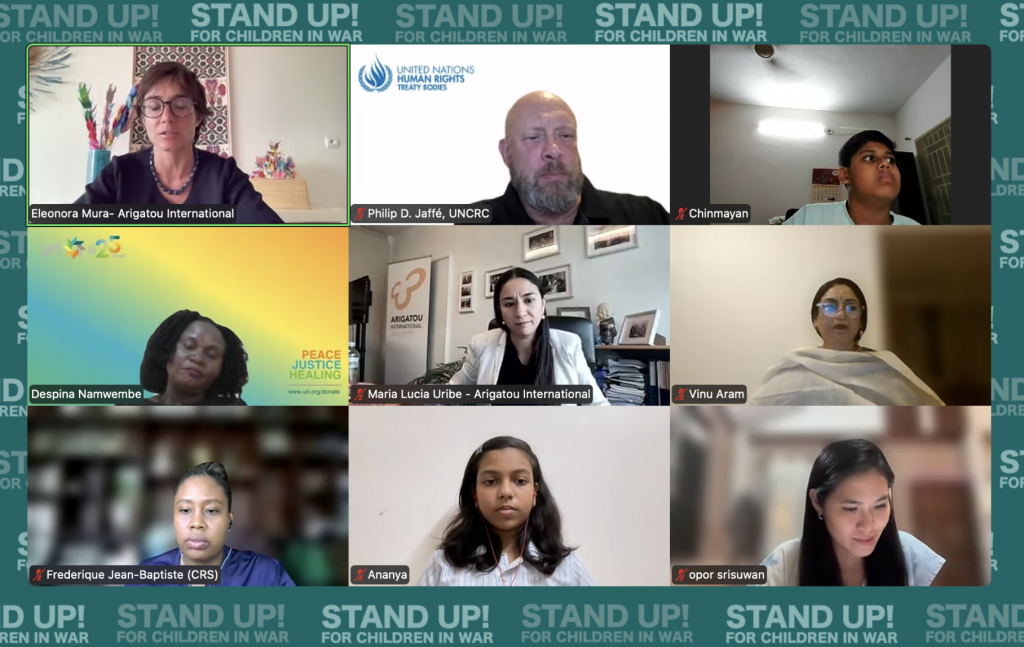
Yesterday, a powerful and moving online gathering brought together 180 participants from diverse regions, faiths, and backgrounds, united by a common conviction: the urgent need for a unified response to protect children caught in armed conflict.
The event marked the culmination of the global campaign “Stand Up for Children in War”, convened by Arigatou International with the support of 32 partner institutions in the framework of the International Day of Peace. The campaign sought to raise consciousness, inspire hope, and call for concrete action to protect children living in the midst of violence.
The gathering featured compelling interventions from advocates, faith leaders, children, and survivors of war, who shared firsthand accounts of the devastating impact of conflict.
Testimonies shed light on the children’s reality in Haiti, Venezuela, the Democratic Republic of Congo, Gaza, Myanmar, Ukraine, and beyond. Speakers emphasized that children must not only be protected but also empowered: to heal, to express themselves, and to be recognized as agents of peace. Faith voices reminded us: children are not collateral, they are sacred. Silence is complicity. To stand up for children in war is to live our faith in action.
The meeting opened with a message from Mr. Hironari Miyamoto, Board Member of Arigatou International and representative of the Myochikai Buddhist Community in Japan: “Violence begins in the human heart, but so does peace,” he said, urging participants to commit to protecting children.
Children themselves also raised their voices. From India, Ananya shared her reflections, expressing solidarity and empathy with children living in the midst of war. Chinmayan then spoke with a deep sense of urgency: “Every single day, these children wake up to the sounds of sirens, not school bells. They live in shelters, not bedrooms. They hold trauma, not toys. But they didn’t start the war, did they? Yet, they still pay the highest price.” He continued with a direct appeal to world leaders: “This is a message for the leaders of nations. We demand peace! We may be small, but our voices are strong.”
Ms. Maria Lucia Uribe, Executive Director of Arigatou International, welcomed participants and expressed gratitude to the partners and children who had joined the campaign and shared their voices. She was followed by Prof. Philip Jaffé, Vice-Chair of the UN Committee on the Rights of the Child, who issued a stark warning: “War traumatizes not just bodies, but spirits. It breeds cynicism, kills hope, and dulls the soul. If we do not change course, we risk raising a generation alienated from caring, distanced from morality, numbed to suffering.”
An invigorating dialogue then followed, moderated by Dr. Mustafa Ali, Secretary General of the Global Network of Religions for Children, which brought forward testimonies from conflict-affected regions. Ms. Frédérique Jean-Baptiste of Catholic Relief Services described Haiti’s multilayered humanitarian crisis, where gangs control 85 percent of the capital city, half of them children, leaving countless exposed to violence and trauma.
From the Great Lakes region in Africa, Ms. Despina Namwembe of the United Religions Initiative spoke about the struggles of radicalized children in the Democratic Republic of Congo and the long, difficult road to recovery. She underscored the urgent need for the media to amplify grassroots narratives of conflict. Mr. Ricardo Treno, a humanitarian volunteer from Brazil with the Fraternity International Humanitarian Missions, highlighted the situation of displaced indigenous children from Venezuela living in Northern Brazil, who face multiple layers of vulnerability. He emphasized the critical importance of keeping migrant culture and roots alive, creating safe spaces for these children while nurturing and protecting their cultural identity.
From Palestine, Mr. Ayed Abu Eqtaish, Accountability Program Director at DCI – Palestine, and Mr. Roger Salameh, Coordinator of GNRC – Palestine, spoke about the atrocities in Gaza and called for international law to be upheld and children to be included in shaping their future. “This is not easy to move on from,” said Mr. Salameh. “We must ensure that children are partners in building their future with dignity.”
“We can see resilience in children every single day. Their eyes still spark with hope,” said Ms. Opor Srisuwan from the International Network of Engaged Buddhists in Thailand, reflecting on the conflict in Myanmar, where 6.8 million children require humanitarian aid. Mr. Hossain Shahid of Islamic Relief Bangladesh noted that his country hosts 1.2 million Rohingya refugees. More than half of them are children. He described how, in the camps, children endure violence, malnutrition, limited access to mental health support and education, child labor, and the constant risks of child marriage and recruitment into militias.
Messages of peace and solidarity filled the chat as participants called for the well-being of children. Yara, a 17-year-old from Sudan, urged leaders: “We, the children who have seen war, are not just symbols of tragedy. We are proof of resilience. But we need you to match our resilience with your actions.”
The call to action was further deepened by faith leaders, moderated by Rev. Fred Nyabera, Executive Director of End Child Poverty at Arigatou International. Dr. Nayla Tabbara, President of Adyan Foundation in Lebanon, reflected that “Children have been scarred for life, not only by the brutality, but also by silence. What we need today is courage—courage to speak up.”
Prof. Anant Rambachan of St. Olaf University offered a profound reflection: “I ask myself, What have we become as a species of being? Who are we that we destroy without hesitation the most innocent and vulnerable, the defenceless among us? (…) How do we go to our places of worship and be stone-hearted about the slaughter of children? Which God do we pray to? Which God do we worship?” He concluded with a piercing question: “If the precious lives of children won’t stop wars, what will?”
Rev. Volodymyr Malchyn, Head of Infrastructure Development at Caritas Ukraine, highlighted the staggering toll of war on children in his country: over 2,500 killed or injured, millions displaced, and countless suffering from trauma. “War is a great evil. We must stand against it with our faith and our actions,” he said.
The gathering concluded with the presentation of the “Statement of Ethical Commitment to Stand Up for Children in War,” endorsed by 145 organizations, five UN agencies, and eight former members of the Committee on the Rights of the Child. It was read by Ms. Frédérique Seidel of the World Council of Churches and Ms. Bushra Rehman of Islamic Relief Worldwide.
Finally, Dr. Vinu Aram, President of Shanti Ashram and co-chair of Arigatou International’s Advisory Group, closed with a reminder of the power of collective action: “May this campaign be a reminder of the strength that comes from working and praying together for a peaceful world.”
Institutions can still sign the statement by clicking here.

